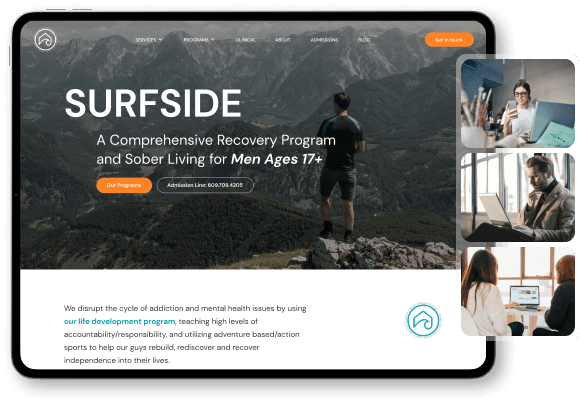blog
SEO Tips for Mental Health Professionals: Reaching Clients Online
Sep 14, 2024
For mental health professionals, creating an online presence isn’t just about being on the internet—it’s about making sure the right people can find you. In today’s digital world, SEO (Search Engine Optimization) is one of the most effective ways to connect with clients seeking mental health support. A strong SEO strategy helps you reach clients who are actively searching for mental health services, resources, and guidance, bringing you closer to those who need your help the most.
In this article, we’ll walk you through the top SEO strategies tailored for mental health professionals. From keyword optimization to local SEO, these tips will help you enhance your online visibility, build client trust, and ultimately expand your reach.
1. Identify and Target Relevant Keywords
Keyword optimization is the foundation of any SEO strategy, and it’s especially important for mental health websites. Identifying the right keywords can help connect you with clients who are searching for mental health services, therapy, counseling, or specific conditions like anxiety and depression.
Research Specific Terms: Use tools like Google Keyword Planner, Ubersuggest, or SEMrush to identify keywords that clients may be using to find mental health services. For instance, “therapist for anxiety,” “counselor for depression,” or “online therapy for mental health” are examples of specific, relevant terms.
Use Long-Tail Keywords: Long-tail keywords (phrases with three or more words) are highly targeted and often reflect what clients are looking for. Examples include “affordable therapy near me” or “licensed therapist for trauma recovery.” These keywords help attract clients who are further along in their search for specific mental health services.
Include Location-Based Keywords: If you offer in-person services, include location-specific keywords like “therapist in [City]” or “counselor near [Location].” This is critical for local SEO, which we’ll cover in more detail below.
2. Optimize Your Website Structure and Content
SEO isn’t just about keywords; it’s also about creating a website structure and content that search engines can easily read and understand. A clear structure improves your website’s SEO and provides a better experience for users, helping them find the information they need.
Organize Content by Service: Break down your services into distinct pages, such as “Individual Therapy,” “Family Counseling,” or “Online Therapy.” This allows you to target specific keywords for each service and helps clients find exactly what they’re looking for.
Use Headers Strategically: Use H1, H2, and H3 headers to structure your content and include keywords where relevant. For example, your main service pages might use headers like “Licensed Therapy for Anxiety” or “Depression Counseling Services.”
Optimize Meta Tags: Write descriptive, keyword-rich meta titles and descriptions for each page. These tags help search engines understand what your page is about and improve your click-through rate from search results. Keep titles under 60 characters and meta descriptions around 150–160 characters for best results.
3. Invest in High-Quality, Relevant Content
Creating valuable, informative content is one of the best ways to improve your SEO and build trust with clients. Blogs, articles, and guides give you a chance to answer common questions, share insights, and position yourself as a knowledgeable mental health professional.
Write Informative Blog Posts: Blogs are an excellent way to target keywords naturally and provide clients with helpful resources. Consider writing about topics like “5 Signs You May Need Therapy,” “Coping with Anxiety,” or “How to Find the Right Therapist.”
Answer Frequently Asked Questions (FAQs): FAQs not only enhance user experience but also improve SEO by targeting long-tail keywords and addressing common client concerns. A well-organized FAQ page covering topics like “What to Expect in Therapy” or “How Much Does Therapy Cost?” can drive relevant traffic.
Update Content Regularly: Keeping content up to date is essential for SEO. Google values fresh, relevant content, so regularly update old blog posts, add new information, or write about trending mental health topics to stay relevant.
4. Leverage Local SEO to Attract Clients in Your Area
If you’re a mental health professional offering in-person services, local SEO is key to reaching clients in your geographic area. Local SEO helps people in your community find your services more easily, particularly through Google search and Google Maps.
Claim and Optimize Your Google My Business Profile: Creating and optimizing a Google My Business (GMB) profile can improve your visibility in local searches. Include accurate business information, add relevant keywords, update your services, and encourage clients to leave positive reviews. This helps your practice appear in Google’s local search results and on Google Maps.
Encourage Client Reviews: Positive reviews are crucial for building trust and improving your local SEO. Encourage satisfied clients to leave reviews on your Google My Business profile, which will improve your search engine ranking and help potential clients feel more comfortable reaching out.
Add Local Keywords to Your Content: Use location-specific keywords throughout your website, including in your meta tags, headers, and service pages. Phrases like “counselor in [City]” or “therapist near [Location]” help you rank higher in searches from local clients looking for mental health support.
5. Optimize Your Website for Mobile Users
More than half of all web traffic comes from mobile devices, so having a mobile-friendly website is essential. Google also prioritizes mobile-friendly sites in search rankings, making mobile optimization a crucial part of your SEO strategy.
Use a Responsive Design: A responsive design ensures your website looks great on all devices, whether clients are using a smartphone, tablet, or desktop. Make sure text is readable, buttons are easy to tap, and images scale appropriately on smaller screens.
Improve Page Load Speed: Fast-loading pages are essential for user experience and SEO. Compress images, minimize code, and use caching to speed up load times on mobile devices. Google’s PageSpeed Insights tool can help you identify areas for improvement.
Simplify Navigation: Mobile users need an easy-to-navigate site. Streamline your navigation by using a clear menu structure and ensuring that essential pages, like “Contact” and “Services,” are easily accessible.
6. Build Quality Backlinks to Boost Credibility
Backlinks—links from other websites to yours—are a powerful way to build authority and improve your site’s SEO. High-quality backlinks signal to search engines that your website is reputable and trustworthy, which can improve your ranking.
Collaborate with Mental Health Blogs and Publications: Reach out to mental health blogs, online magazines, or local publications to share your insights, write guest posts, or provide quotes. When these websites link back to your site, it improves your authority in the mental health field.
Get Listed on Mental Health Directories: Online directories for mental health professionals, such as Psychology Today or GoodTherapy, can be valuable sources of backlinks. These sites often have high authority, and having a profile with a link to your website can improve your visibility.
Share Content on Social Media: While social media links are not traditional backlinks, they still drive traffic and can indirectly improve SEO by increasing engagement with your website. Share blog posts, educational resources, and practice updates on platforms like LinkedIn, Facebook, or Instagram to reach a broader audience.
7. Use Schema Markup to Enhance Search Visibility
Schema markup is a type of code that helps search engines understand the content on your site better. By adding schema markup, you can improve how your site appears in search results, potentially increasing click-through rates and visibility.
Add Local Business Schema: If you have a physical practice location, add Local Business schema markup to provide search engines with information like your business hours, address, and phone number. This helps boost your presence in local search results.
Use FAQ Schema for Common Questions: FAQ schema is a valuable tool for mental health websites with frequently asked questions. This markup allows Google to display your questions and answers directly in search results, giving users quick access to key information and potentially increasing your site’s visibility.
Include Review Schema: If you have client reviews or testimonials, use review schema to highlight positive feedback in search results. This can enhance credibility and help potential clients feel more confident about your services.
Final Thoughts: Reaching Clients Through Strong SEO Practices
For mental health professionals, SEO is an invaluable tool for expanding your reach and connecting with clients who need support. Implementing these SEO strategies—from keyword optimization to local SEO and content creation—can significantly improve your online visibility, helping you reach more clients in need.
Creating an optimized, accessible, and informative website will not only attract clients but also establish trust, credibility, and a professional online presence. By investing in SEO, mental health professionals can make a meaningful impact on the lives of those seeking support and strengthen their practice in today’s digital age.
Do you find this article useful?
We create beautiful websites for mental health businesses that will help families and people in need to make the right choice. Let us help you improving your website, we got the experience and the passion to convert visitors into customers.
Get in touch and let us help you with your website
Prev
Next



